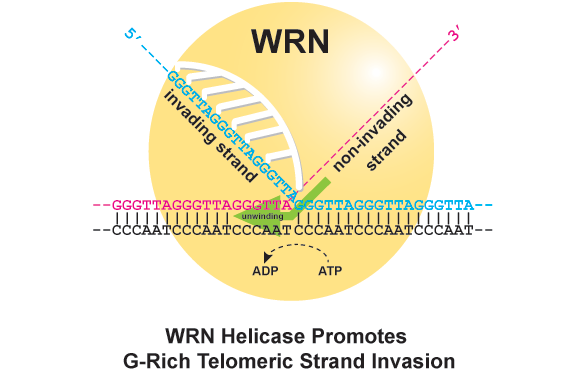Orren/Machwe Study Linking Premature Aging and Cancer Development to Defective Telomeric Recombination Featured in Nature Communications
Led by Drs. David Orren and Amrita Machwe of the Department of Toxicology and Cancer Biology and the Markey Cancer Center and conducted jointly by recent Ph.D. graduate Deanna Edwards and Dr. Machwe, this article was published online in the September 30 issue of the prestigious, interdisciplinary scientific journal Nature Communications. The research clarifies a putative telomeric maintenance function for the WRN protein that is defective in the cancer-prone and premature aging hereditary disease, Werner syndrome.
Located at the ends of each chromosome, telomeres are critical for maintaining genome stability. Conversely, telomere dysfunction during lifespan is postulated to contribute to age-related diseases including cancer. The research in the article provides further insight into these relationships by demonstrating that WRN acts preferentially on specific telomeric DNA structures that reflect key intermediates in telomeric metabolism. These observations (as well as another recently published study from the Orren/Machwe lab) indicate that WRN likely participates in telomeric recombination pathways that help lengthen and/or stabilize telomeres, particularly in most somatic human cells that lack expression of telomerase, another important telomere maintenance enzyme. In somatic cells lacking functional WRN, telomeres frequently become dysfunctional, leading to 1) increased cell senescence and apoptotic cell death that contribute to premature aging characteristics or 2) telomeric fusions that fuel rampant chromosomal instability and carcinogenesis, thus explaining the primary characteristics associated with Werner syndrome. Moreover, since telomere maintenance is critical for sustained tumor growth, this research points to WRN as a potential target for anti-cancer therapeutics.
The study, funded primarily by the National Institute on Aging/National Institutes of Health and a training grant to Toxicology and Cancer Biology from the National Institute of Environmental Health Sciences, also included investigators from the UK Department of Cancer Biostatistics and the National Institute on Aging.
